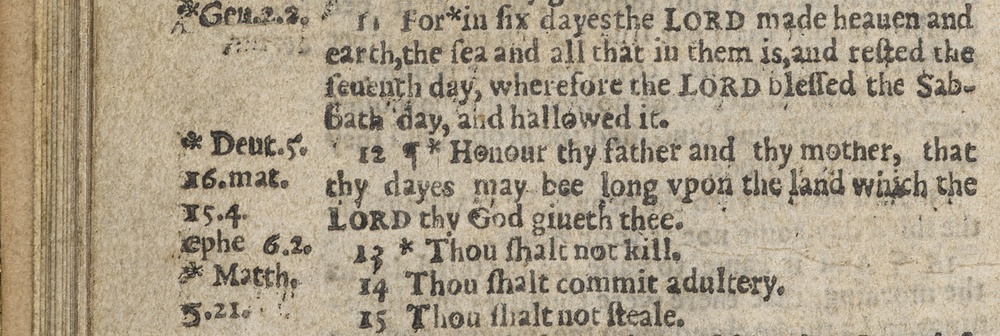RUTH FRENDO WRITES ABOUT ROBERT BARKER, INFAMOUSLY KNOWN FOR HIS PRINTING OF THE WICKED BIBLE
12 MAY 2020

A Stationer from the past made a somewhat ignominious appearance on Twitter recently, in this tweet on what might be ‘the most famous typo in history’.
In 1631, Robert Barker printed an edition of the bible which missed out the crucial word ‘not’ from one of the Ten Commandments. The resulting commandment - that the faithful should, in fact, commit adultery – led to the text acquiring the moniker ‘the Wicked Bible’, and did not end well for its printer. I’ve received a few queries about just who Robert Barker was, so here’s some background to the story.
Robert’s father Christopher was a prominent publisher, who obtained a patent to print the Geneva Bible in 1575, and acquired the office of Queen’s Printer in 1577. Originally a Draper, Christopher Barker translated to the Stationers’ Company in 1578, and subsequently became an active member of the Livery. Robert was admitted to the Stationers’ Company by patrimony in 1589, and that year Christopher and Robert Barker were granted lifelong patents as Royal Printers. This included the exclusive right to print bibles in English.
So it was inevitable that in 1611, it was Robert Barker who printed a new English translation of the bible, authorised by King James I. While this commission was both prestigious and potentially lucrative, it was also an expensive one, and Barker had to borrow money to cover the costs of preparing the manuscript and producing the printed text. As it wasn’t until the mid-seventeenth century that the King James Version found its place in the nation’s devotional and literary canon, the investment did not pay off. Barker, father to numerous children (the generally agreed number is thirteen), soon found himself in financial difficulties. He seems to have been singularly unlucky in his attempts to resolve these, and was embroiled in litigation by 1631, when the printing fiasco of the Wicked Bible occurred. The fact that this version contained two scandalous errors – the surprisingly frequent printers’ omission of the word ‘not’, and the far more outlandish replacement of ‘greatnesse’ by ‘great-asse’ (pointed out by Ian Gadd in his answering tweet) – has led some historians to suspect that the enterprise had been sabotaged. Be that as it may, the fine imposed on Barker ruined him, and he spent the rest of his life in a debtors’ prison.

Court record of Robert Barker's Company pension, 5th May 1645 (Stationers' Company Archive, TSC/1/B/01/01)
Ironically, as most copies were withdrawn from sale and destroyed when the errors were discovered, the ‘Wicked Bible’ is today a highly valued collector’s item. Only fourteen copies are still known to exist, and in 2018, Sotheby’s sold one of these at auction for $56,250. It’s difficult to imagine what Robert Barker would have made of that transaction.
Main image: Offending text from the 'Wicked Bible' (British Library image)